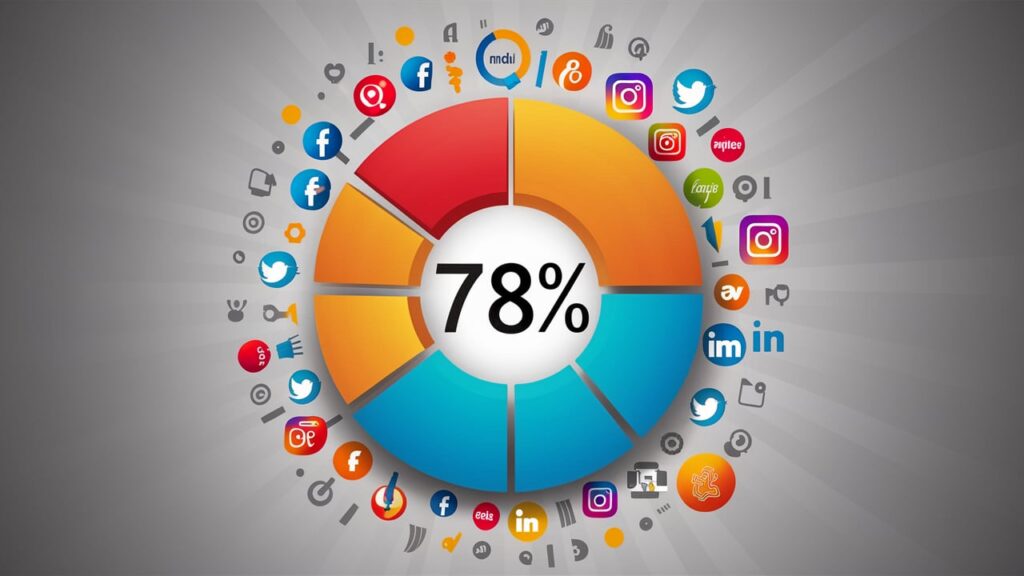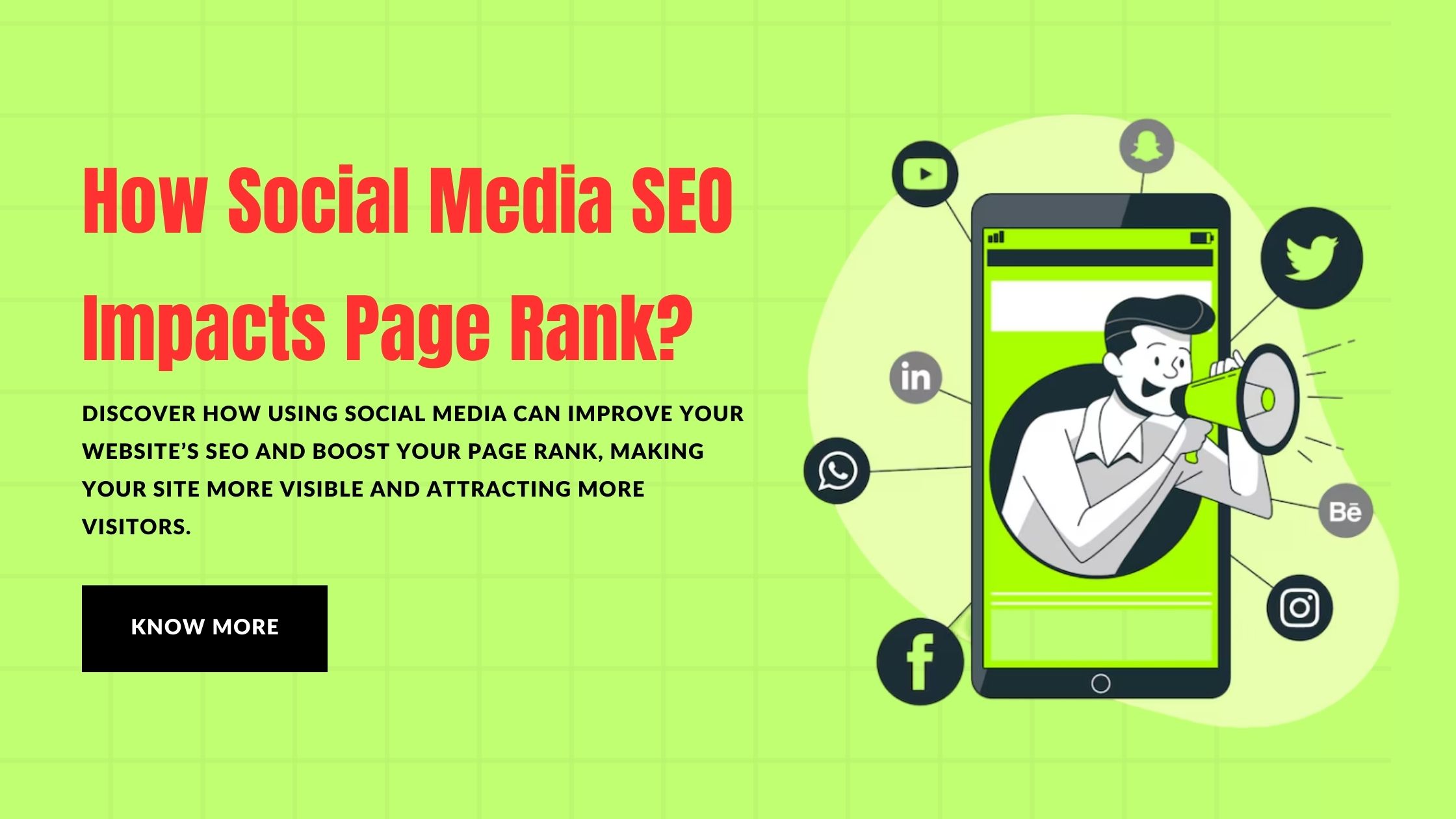Did you know that 78% of businesses that use social media for SEO have seen their search engine rankings increase? This impressive statistic highlights the significant impact social media can have on your website’s visibility and overall, SEO strategy. In this blog, we’ll explore how social media affects SEO page rank, the mechanisms behind it, and how you can leverage social media to increase your website’s visibility. By understanding the connection between social media and SEO, you’ll be better equipped to improve your online presence and drive more traffic to your site.

Understanding social media SEO
Social media SEO refers to the strategic use of social media platforms to increase a website’s search engine rankings. It involves leveraging social media channels such as Facebook, Twitter, Instagram, LinkedIn, and others to promote content and engage with audiences in ways that positively impact organic search visibility. Unlike traditional SEO techniques that focus primarily on optimizing a website’s content and structure for search engines like Google, social media SEO uses the authority and reach of social platforms to indirectly influence search engine rankings. The main principle of social media SEO is to increase the visibility and engagement of content on social networks, increasing the chances of earning backlinks, mentions, and shares. These social signals contribute to improved domain authority and brand credibility, which are factors considered by search engine algorithms when determining search result rankings.
Importance of Social Media in SEO
Social media plays a vital role in modern SEO strategies for several key reasons:
1. Increased website traffic: Social media platforms have billions of active users worldwide, making them powerful channels for driving traffic to websites. By sharing content that resonates with your audience, you can attract visitors who may not have found your site through traditional search engine results.
2. Increased content visibility: Every share, like, comment, and mention on social media contributes to the visibility of your content. When content gains traction on social platforms, it increases its chances of being discovered by new audiences and potentially earning natural backlinks from other websites, which are valuable for SEO.
3. Build brand authority and trust: Active participation on social media allows brands to build authority within their niche. Regularly sharing valuable content, engaging with followers, and answering inquiries helps establish trust and credibility. Search engines consider these factors when assessing the quality and relevance of a website.
4. Social signals affect SEO: While search engines such as Google have stated that social signals (such as likes, shares, and comments) are not direct ranking factors, there is evidence that they indirectly affect rankings. Content that performs well on social media attracts more engagement, which can lead to increased visibility and organic traffic over time.
5. Supporting link building efforts: social media is a fertile ground for fostering relationships with influencers, bloggers, and other content creators who can amplify your content and link back to your website. These natural backlinks are highly valuable for SEO because they signal to search engines that your content is authoritative and worthy of citation.
6. Improve local SEO: For businesses targeting a local audience, social media profiles can significantly impact local SEO efforts. Customizing profiles with accurate business information, engaging locally, and encouraging customer reviews can increase local search visibility and attract nearby customers.
Mechanisms of how social media affects page rank
Increase in website traffic
Social media platforms serve as powerful channels to drive traffic to a website. By sharing content that resonates with their audience on platforms such as Facebook, Twitter, Instagram and LinkedIn, businesses can attract clicks that lead users to their website. Every visit generated from social media represents a positive signal to search engines, indicating that the content is relevant and engaging. This influx of traffic not only increases the visibility of the website but also enhances its authority in the eyes of search engines such as Google.

Social media’s ability to drive traffic stems from its vast user base and the potential virality of the content shared. When users find valuable or interesting content on social media, they are likely to click through to learn more or explore related topics on the website itself. Therefore, an active and strategic presence on social platforms can significantly contribute to a website’s overall traffic metrics, which is a favorable factor for SEO.
Content distribution and engagement
The sharing and engagement of content on social media directly impacts SEO by signaling its relevance and quality. Content with shares, likes, comments, and other forms of engagement is valued by both users and search engines alike. Social media platforms act as distribution channels, extending the reach of content beyond a website’s own audience.
When content is widely shared and engaged with on social media, it increases its visibility and ability to attract inbound links from other websites. This social validation through shares and engagement signals to search engines that the content is trustworthy and authoritative. As a result, search algorithms can reward such content with higher rankings in search results, with the goal of providing the most relevant and valuable content to users.
Brand awareness and authority
Building brand authority is crucial for SEO, and social media plays a key role in this process. A strong presence on social platforms allows businesses to showcase their expertise, interact with their audience, and demonstrate thought leadership within their industry. Consistently sharing informative and engaging content helps establish trust and credibility, positioning the brand as a reliable source of information.
Search engines take into account a brand’s perceived authority and credibility when determining search rankings. Therefore, a strong social media presence that consistently provides valuable content and engages with followers can indirectly impact SEO by increasing brand perception and recognition. Brands that are considered authoritative are more likely to attract organic traffic, natural backlinks, and higher engagement rates, all of which contribute to better search engine rankings. Backlink opportunities Social media facilitates the discovery and sharing of content across diverse online communities. When content shared on social media engages with users, it is more likely to be reposted or linked to by other websites and blogs. These natural backlinks are highly valuable for SEO, as they signal to search engines that the content is credible and worthy of citation. Effective social media strategies can increase the visibility and virality of content, attracting organic backlinks from authoritative sites. Each backlink acts as a vote of confidence in the relevance and quality of the content, which contributes to higher domain authority and better rankings in search results.
Practical tips for leveraging social media for SEO
Social media has become a vital tool for enhancing SEO strategies, providing avenues for increasing content reach, connecting with audiences, and strengthening brand authority. Here are practical tips for effectively leveraging social media for SEO:

Create shareable content
The foundation of successful social media SEO starts with creating content that resonates with your audience and encourages sharing. Focus on:
1. Quality and relevance: Produce high-quality content that addresses your audience’s interests and pain points. Whether it’s an informative article, engaging visual, or entertaining video, make sure your content adds value.
2. Trigger engagement: Produce content that evokes emotions, inspires discussion, or offers practical solutions. Content that triggers positive emotions like awe, humor, or inspiration tends to get more shares.
3. Visual appeal: Use engaging visuals like infographics, images, and videos to make your content more engaging and shareable. Visual content attracts more attention and shares on social media platforms.
4. Calls-to-action (CTAs): Explicitly encourage sharing by including social sharing buttons and CTAs in your content. If your audience finds your content valuable, motivate them to share.
Connect with your audience
Active engagement is the key to fostering a loyal community on social media, which in turn boosts SEO:
1. Respond promptly: Respond promptly to comments, messages, and mentions. Engage in meaningful conversations and show appreciation for feedback.
2. Start discussions: Ask questions, conduct polls, or solicit opinions from your audience. Encourage dialogue and create opportunities for engagement.
3. User-generated content (UGC): Encourage users to create and share content related to your brand. UGC not only boosts engagement but also provides authentic endorsement.
4. Community building: Build a community around your brand by connecting with influencers, industry leaders, and advocates. Building relationships can increase your reach and credibility.
Use hashtags and keywords
Optimizing your social media posts with hashtags and keywords improves discoverability and increases SEO impact:
1. Research relevant keywords: Identify keywords relevant to your industry, target audience, and trending topics. Incorporate these keywords naturally into your posts and profile descriptions.
2. Hashtag strategy: Use relevant and trending hashtags to increase the reach of your posts. Research popular hashtags in your niche and integrate them strategically.
3. Create branded hashtags: Develop unique hashtags associated with your brand or campaigns. Encourage followers to use these hashtags when sharing content related to your brand.
Optimize social media profiles
Well-optimized social media profiles contribute to a consistent online presence and improve SEO:
1. Complete profile: Make sure all fields in your social media profile are filled out completely and accurately. Include relevant keywords in your bio and description.
2. Professional branding: Use consistent branding elements such as logos, color schemes, and tone of voice across all social media platforms. Maintain a professional and consistent brand image.
3. Link to your website: Include links to your website and other relevant online properties in your social media profile. Direct traffic from social platforms to your website to improve overall SEO metrics.
Track and analyze performance
Monitoring social media metrics is essential to refine your strategy and maximize SEO benefits:
1. Analytics tools: Use analytics tools provided by social media platforms (e.g., Facebook Insights, Twitter Analytics) to track key metrics such as engagement, reach, clicks, and shares.
2. Identify trends: Analyze which types of content perform best and resonate most with your audience. Adjust your content strategy based on these insights to optimize engagement and shareability.
3. Adjust strategy: Continuously refine your social media strategy based on performance data. Experiment with different content formats, posting times, and messaging to optimize results.
Social media SEO represents a powerful fusion of social media strategies with traditional SEO practices, offering businesses unprecedented opportunities to grow their online presence and improve search engine rankings. Through this blog, we have explored various aspects of how social media impacts SEO and provided practical tips and case studies to demonstrate its effectiveness. Let’s summarize the key points discussed and provide a compelling call to action for readers.
Summary of Key Points
Social media SEO leverages the massive reach and engagement capabilities of platforms like Facebook, Twitter, Instagram, and LinkedIn to achieve several important SEO objectives:
1. Drive traffic: Social media platforms serve as powerful channels to direct traffic to your website. By sharing engaging content and engaging with your audience, you can attract visitors who may not have found your site through traditional search engine results alone.
2. Drive engagement: Active participation on social media promotes meaningful conversations with your audience through likes, shares, comments, and discussions. Content that resonates on social platforms often receives high engagement metrics, which signal its relevance and quality to search engines.
3. Build authority: Establishing a strong presence on social media establishes your brand as an authoritative voice within your industry. Consistently sharing valuable content, engaging with followers, and collaborating with influencers contribute to increasing your brand’s credibility, which is a key factor in search engine algorithms.
4. Create backlink opportunities: Content shared on social media has the potential to attract natural backlinks from other websites and blogs. These inbound links signal to search engines that your content is trustworthy and valuable, positively impacting your SEO rankings.
Now that you understand the important role of social media in SEO, it’s time to take action:
• Implement the tips: Start integrating social media into your SEO strategy today. Focus on creating shareable content, engaging with your audience, using hashtags and keywords effectively, optimizing your social media profiles, and tracking performance metrics.
• Track your progress: Monitor the impact of your social media efforts on your website traffic, engagement metrics, and search engine rankings. Use analytics tools to measure performance and identify areas of improvement.
• Adjust your approach: SEO and social media strategies evolve over time. Stay agile and be prepared to adjust your strategy based on performance insights and changes in algorithms.
By consistently implementing these strategies and refining your approach, you can maximize the synergy between social media and SEO to achieve sustainable growth and visibility for your brand.
Additional Resources
To further support your journey into social media SEO, here are some useful tools and articles:
1. Tools for social media management:
- Hootsuite
- Buffer
- Sprout Social
2. Articles on social media SEO:
- Social Media Examiner – Social Media SEO: How to Optimize Your Profile
- Neil Patel – How Social Signals Affect Search Engine Rankings
These resources provide valuable information, tools, and strategies to help you effectively leverage social media for SEO purposes. Explore them to deepen your understanding and refine your social media SEO strategy.
In short, using social media with your SEO is very important today. It helps you get more visitors to your website, connect with people, become an expert in your field, and get more links to your site. It can greatly improve how often people see your website in search results. Start using these strategies now to grow your business online and achieve long-term success.

